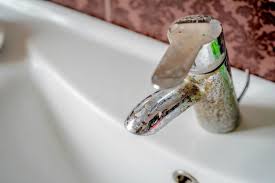Hard water is a common issue that affects many households. It contains high levels of minerals, particularly calcium and magnesium, which can lead to several plumbing-related problems. Over time, hard water can cause scale buildup in pipes, reduce the efficiency of water heaters, and leave stains on fixtures and appliances. Addressing hard water problems in Plainfield is essential to maintaining the longevity of your plumbing system and improving water quality. We will explore effective plumbing solutions for hard water problems, including water softeners, descalers, and regular maintenance techniques.
Understanding the Impact of Hard Water on Plumbing
Before delving into specific solutions, it’s important to understand how hard water affects your plumbing system. When water is high in minerals like calcium and magnesium, it can leave behind deposits as it moves through pipes and appliances. This buildup, known as limescale, can clog pipes, reduce water flow, and decrease the efficiency of appliances such as water heaters, dishwashers, and washing machines.
Over time, the buildup in pipes can lead to restricted water flow, strain the plumbing system, and potentially cause leaks or bursts. Additionally, hard water can affect the quality of your home, leaving mineral deposits on faucets, sinks, and showerheads, which can lead to unsightly stains and decreased water pressure. Understanding these effects helps homeowners take the necessary steps to prevent and address hard water issues.
- Installing a Water Softener
One of the most common and effective solutions for hard water problems is the installation of a water softener. A water softener removes the calcium and magnesium ions from the water and replaces them with sodium or potassium ions, which do not cause scaling or buildup. This process, known as ion exchange, effectively “softens” the water, making it easier on your plumbing system and improving water quality throughout your home.
Water softeners are available in various sizes and configurations, making it easy to find a system that meets your household’s needs. Installing a water softener can prevent the buildup of limescale in pipes and appliances, extend the life of your plumbing system, and improve the efficiency of water heaters. In addition to protecting your plumbing, softened water reduces the amount of soap and detergent needed for cleaning, making it a cost-effective solution for hard water problems.
- Using Descalers and Conditioners
While water softeners are highly effective, they are not the only solution for hard water problems. Another option is using a water conditioner or descaler, which alters the structure of the minerals in the water, preventing them from adhering to surfaces and forming scale. Unlike water softeners, which remove the minerals from the water, descalers change how the minerals behave, reducing their ability to cause buildup in pipes and appliances.
Descalers are typically installed on the main water supply line and use electromagnetic or catalytic processes to treat the water as it enters your home. This solution can be particularly useful for households that prefer to avoid adding sodium or potassium to their water, as water softeners require. While descalers may not eliminate hard water, they can significantly reduce the impact of limescale on your plumbing system and improve water flow over time.
- Regular Maintenance for Hard Water Buildup
In addition to installing water softeners or descalers, regular maintenance is key to managing hard water problems. Even with these systems in place, cleaning and maintaining your plumbing fixtures and appliances is important to prevent limescale buildup. For example, regularly descaling your water heater can improve its efficiency and lifespan. This involves draining the tank periodically and removing any accumulated mineral deposits at the bottom.
Similarly, cleaning faucets, showerheads, and other fixtures with vinegar or commercial descaling products can help remove mineral deposits and maintain water flow. Regular maintenance of dishwashers and washing machines is also essential, as hard water can reduce their performance over time. Using a water softener or descaler alongside regular cleaning and maintenance helps ensure your plumbing system functions properly despite hard water challenges.
- Protecting Appliances from Hard Water Damage
Hard water can significantly impact the performance and lifespan of household appliances that rely on water, such as dishwashers, washing machines, and coffee makers. Limescale buildup on heating elements and internal components can cause these appliances to work less efficiently, leading to higher energy bills and the need for repairs or replacements sooner than expected.
Homeowners can use water softeners or descalers as a preventive measure to protect appliances from hard water damage. Additionally, some manufacturers offer descaling products specifically designed for certain appliances, which can help remove mineral deposits and restore performance. Regularly running descaling cycles in appliances like coffee makers and dishwashers ensures that hard water does not affect their efficiency or longevity.
- Considering Whole-House Water Filtration Systems
For homeowners looking for a comprehensive solution to hard water problems, a whole-house water filtration system may be worth considering. These systems filter all the water entering your home, addressing hard water issues and other contaminants such as chlorine, sediment, and heavy metals. Whole-house filtration systems can be customized to include water softening or conditioning features, providing an all-in-one solution to improve water quality and protect your plumbing system.
By filtering water at the entry point, whole-house systems ensure that all fixtures, appliances, and plumbing are protected from hard water and other harmful contaminants. While these systems require a larger upfront investment than standalone water softeners or descalers, they offer long-term benefits for your home’s water quality and overall plumbing health.
Hard water can cause significant problems for your plumbing system, but there are effective solutions to address this issue. Installing a water softener, using descalers, and performing regular maintenance can prevent limescale buildup and improve the efficiency of your pipes and appliances. Additionally, taking steps to protect appliances from hard water damage and considering whole-house filtration systems can further enhance the longevity of your plumbing. By proactively addressing hard water problems, homeowners can ensure that their plumbing systems continue functioning efficiently and avoid costly repairs or replacements.
